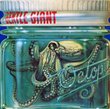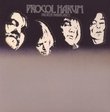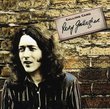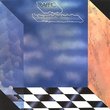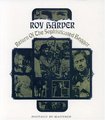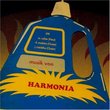| All Artists: Roy Harper Title: Flat, Baroque And Berserk Members Wishing: 0 Total Copies: 0 Label: Science Friction Original Release Date: 3/1/1970 Re-Release Date: 10/1/1997 Genres: Folk, Pop, Rock, Classic Rock Styles: Contemporary Folk, Singer-Songwriters, Blues Rock, Folk Rock, Album-Oriented Rock (AOR) Number of Discs: 1 SwapaCD Credits: 1 UPC: 679076770287 |
Search - Roy Harper :: Flat, Baroque And Berserk
 | Roy Harper Flat, Baroque And Berserk Genres: Folk, Pop, Rock, Classic Rock
Reissue of 1970 album for Harvest, one of his most successful. 12 tracks including 'Don't You Grieve', 'How Does It Feel ' and 'East of the Sun'. 1999. |
Larger Image |
CD DetailsSynopsis
Album Description Reissue of 1970 album for Harvest, one of his most successful. 12 tracks including 'Don't You Grieve', 'How Does It Feel ' and 'East of the Sun'. 1999. Similar CDs
|
CD ReviewsFor all who love songwriting Martin G. Walker | Brooklyn, NY USA | 07/07/2007 (5 out of 5 stars) "If you love songs and songwriting you will love this album. Roy Harper deserves to be recognized as one of the master songwriters of the last fifty years. On this particular album, Another Day gives a perfect example of Roy's genius for telling a story with economical and vivid lyric and melody. Harper uses everyday idioms and settings -- a visit for tea, for instance, to set his characters in a solid real world, then transports us into their minds and emotions with the flick of his pen -- "I wish that I had 'cause I'm feeling so sad that I never had one of your children..." Wonderful!" Roy Harper finally gets it right Joao Nunes | Portugal | 11/28/2008 (5 out of 5 stars) "After a brilliant start with Sophisticated Beggar, it took a while for Roy Harper to get it right. Ghengis Smith was a messy affair and although things started shifting with Folkjokeopus, it was with Flat Baroque and Berserk that Roy cleared the table and nailed an album that proved the amazing songwriter that he was. For the first time Roy forgot about pop psychedelia or trying to get his songs played on the radio and focused his music within the folk framework where it always worked better. Not only we get more focused (and better) songs but, thanks to the striped to essential arrangements and production, there is more room for Roy's voice and guitar playing to breath. If Roy could be an excellent guitarist with a quite distinctive style, it is his singing that really shines throughout this album. The album has two obligatory songs in the Roy Harper songbook. The album's centrepiece is "I Hate The White Man" and the title says it all - this is not the average hippy throw at capitalism, society or whatever. The song works on the thematic palette Roy had developed on "McGoogan's Blues" but with more effective results. The intro speech is a must, with a semi-stoned Roy giving a small lecture to his audience and saying how much better it is in the poor countries "with the dogs in the sun and the kids in the dirt". Personally, I find the song a bit boring but "White Man" became one of Roy's most well-known songs and its importance in his body of work is undeniable. The other classic on the album is "Another Day" which is simply one of the most beautiful love songs ever written. It's also a requiem for an old failed relationship. Roy sings the characters' love, angst, tenderness and resignation with an outstanding, subtle performance. The self-contained emotion in Roy's singing gives the song a false calm that doesn't overshadow its drama and tension. It's a sad song but in the end it leaves you with a peaceful feeling. Along with "White Man" the album has a number of long semi-epic songs that I find more rewarding than the former, such as "Tom Tiddler's Ground", "Goodbye" and, specially "How Does It Feel" which I would rate as the best song of the album. With lyrics that could cut through the bone of the most cold-blooded yuppie and another dramatic vocal performance, this is the kind of song that leaves you thinking. "How does it feel to be completely unreal?" he asks - "You can feel bona fide if you ride with the tide, but it's not real." Like someone wrote, Dylan was never so brutally honest. Along the bigger tunes Flat Baroque and Berserk has a handful of lovely little songs like "Francesca" and "East Of The Sun" that balance the album toward perfection. The only flaw on the album is the final "Hell's Angels". Not that it is a bad song. It just doesn't have anything to do with the rest. After this string of beautiful, intense songs, something I don't need is 7 minutes of psychedelic wah-wah. In spite of the awkward final, Flat Baroque and Berserk is a masterpiece in its own right, only surpassed in Roy's catalogue by its follower Stormcock. One last thought: the crazy sleeve photo would make a very nice double gatefold special edition. So I hope Roy finds the money to continue the work he has done with Stormcock and HQ. He certainly deserves it." The first classic Elliot Knapp | Seattle, Washington United States | 04/09/2007 (5 out of 5 stars) "1970 found Roy Harper producing his fourth full-length LP, Flat Baroque and Berserk. It also found him cutting out the somewhat clumsy, group-oriented sounds found on Come out Fighting Ghengis Smith and Folkjokeopus and returning to the folky, acoustic sounds that typified his first album, as well as markedly focusing on the poetic lyrical heights that he was obviously capable of. As a result, Flat Baroque and Berserk is his strongest album since his debut, Sophisticated Beggar, and the first in a long line of mind-blowing classics that spanned the 1970's.
The album opens with "Don't You Grieve," a new spin on the Jesus/Judas story, told from Judas' point of view. Right away, it's obvious that Roy hasn't lost his trademark sense of humor, but where his irreverence tended to detract on earlier albums, the irony and cleverness here ties in with songs that have serious meaning--digging at religion. This occasional combination of humor and seriousness is one of Roy's trademarks, and this album is when it really starts working. Plus, "Don't You Grieve" is a pretty rocking song. Between tracks one and two is a snippet of Roy's legendary, rambling between-song banter, an essential part of this album and a glimpse into Roy's inimitable live show. Track two, "I Hate the White Man" might be Roy's most controversial song (and that's saying a lot when you talk about Roy!), a burning mini-epic that lambastes the arrogance of white culture from the inside out. In a lot of ways, "I Hate the White Man" takes up where Folkjokeopus' "McGoohan's Blues" (which saved the album and showed the dizzying heights he could reach) left off--Roy really came alive, showing his gift for breathtaking, incandescent lyrics, his skill at skewering the deluded, and an edgy use of his incomparable voice. When you hear songs like these, you start to wonder why more people don't know about Harper's music. The first two songs are classic tunes, but through the entire rest of the album there isn't a weak track (I'll talk about "Hell's Angels" a bit later). The deceptively light "Feeling All the Saturday" juxtaposes images of Roy's infant son with images of Roy resting his "toes on the horizon"--the song was written after Roy was told by a doctor that he only had a short time to live (he was plagued by a cardiovascular disorder that was only just cured in the early 2000's and repeatedly threatened his life). "How Does it Feel" is another classic, with a soaring vocal and some great verse-to-verse rhymes. Roy's fingerstyle acoustic playing is in good form on songs like "Davey" and "Francesca," showing hints of his inimitable style and his more progressive work to come. "Tom Tiddler's Ground" is another great tune that Roy still plays live, with a mysterious lyric and a great recorder accompaniment. The song also has a classic Roy moment--when the engineer tells him the tape is "Rolling," Roy responds, "A joint? Well you better had be then, hadn't you?" The album closes with one of Roy's classic throwaways--"Hell's Angels." Until the end, it's an entirely acoustic and subtle album, until the heavy lumbering rock of "Hell's Angels" breaks the spell. It's one of the funniest album closers ever--Roy intentionally spoiling his own vibe--but it's also a potent commentary on the Angels and contains the classic line; "Free speech!! One each!!" Yet another instance of Roy paradoxically creating meaningful throwaways, and displaying an eccentricity and brilliance unmatched by any of his peers. Overall, Flat Baroque and Berserk is one of Roy's first records that really works from start to finish (with the exception of Sophisticated Beggar), and it remains today as glittering as the day it was released. Science Friction's remaster sounds flawless. If you're just approaching Roy's music for the first time, this is a great place to start, since it's accessible, but also shows most of Roy's greatest qualities--lyrics, musicianship, wit, and voice, and hints to the out-there progressive folk territory he would soon map on his magnum opus, Stormcock." |

 Track Listings (12) - Disc #1
Track Listings (12) - Disc #1